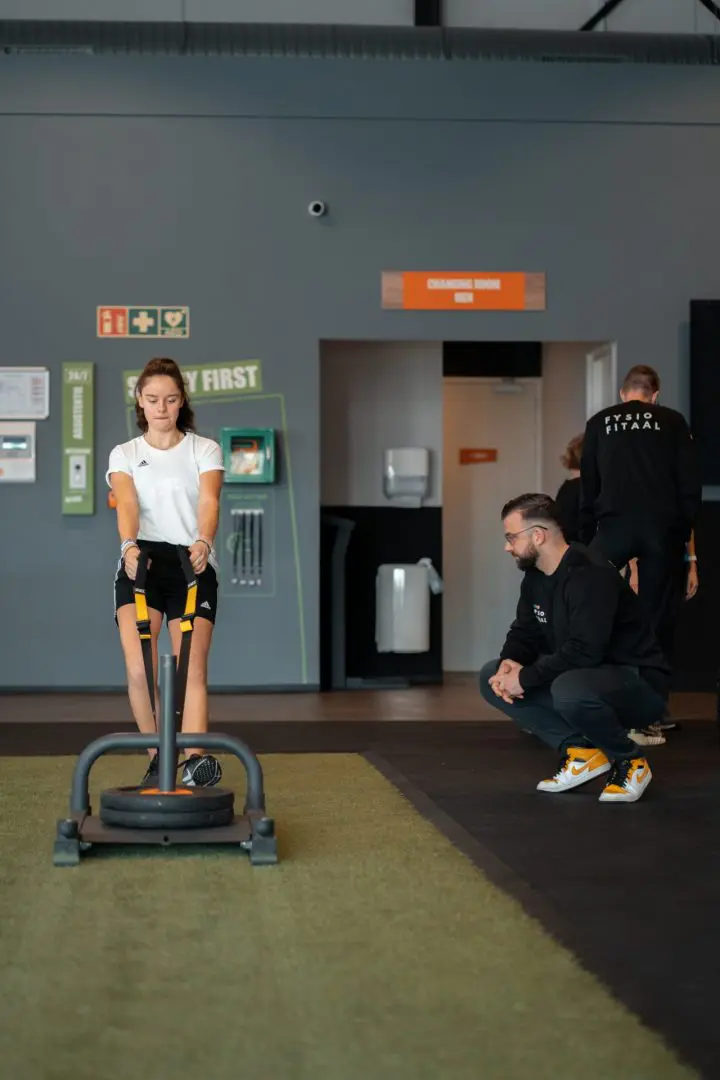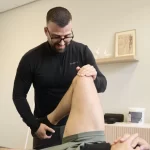What does an intake appointment at our sports physio in Tilburg look like? Physio Fitaal practice
At Physio Fitaal in Tilburg, we believe that a thorough intake forms the basis for an effective and personalised treatment. Whether you are a professional athlete or an enthusiastic amateur, our specialised sports physiotherapists are here to help you recover from injury. We also like to help you improve your performance after your injury and make sure you can get back to doing what you love without any problems. In this blog, we detail what to expect during a intake appointment at our practice.

The first appointment at a sports physio
Our intake starts with a comprehensive anamnesis, during which the sports physiotherapist asks detailed questions about your current complaints, medical history and specific goals. This conversation is essential to get a good picture of your physical condition and the factors that may be contributing to your symptoms. Questions to expect include:
- When and how did your symptoms start?
- Have you had similar complaints before?
- What sports do you play and at what level?
- How would you describe the pain you are currently experiencing?
- Are there any specific movements or activities that aggravate or reduce the pain?
This information helps the physiotherapist get a full picture of your situation and develop a targeted approach.
The physical examination at a sports physiotherapist's office
The anamnesis is followed by a thorough physical examination. The sports physiotherapist will ask you to perform various movements and will examine your body at specific points. This examination may include:
Inspection and palpation: The physiotherapist looks at the affected areas and feels for any swelling, warmth or other abnormalities.
Motion analysis: You will be asked to perform certain movements such as bending, stretching, twisting and other specific movements relevant to your sport. This involves paying attention to range of motion, stability and any restrictions or pain.
Muscle strength and flexibility: The strength and flexibility of the muscles involved are assessed. This may involve pushing against resistance or doing certain stretches.
Specific research: when possible, we can always perform specific tests to further assess the symptoms. For example, when an anterior cruciate ligament injury is suspected, we can use certain tests that are very reliable to make a statement about the injury.
Functional tests: Depending on your symptoms and sport, specific tests may be performed to evaluate the function of your joints and muscles. Think of balance tests, jump tests or speed tests.
Ultrasound: plays an important role in sports physiotherapy. It allows us to obtain real-time images of muscles, tendons, and joints. Ultrasound can also help plan targeted treatments and monitor progress, contributing to a more efficient and effective rehabilitation process.
Based on the findings from the history and physical examination, the sports physiotherapist will make a preliminary diagnosis. The physiotherapist will also explain what this diagnosis means and how it affects your sports performance and daily activities.
It is important that you understand what is going on with your body so that you can actively participate in your treatment plan yourself. The physiotherapist will therefore take the time to answer your questions and discuss any concerns you may have.
Drawing up a treatment plan
After the diagnosis, the sports physiotherapist will create a treatment plan tailored to your specific needs and goals. This plan can consist of several components, such as:
- Manual therapy: Techniques to mobilise joints and muscles and reduce pain.
- Exercise therapy: A tailor-made exercise programme to improve strength, flexibility and stability.
- Sports-specific training: exercises and drills focused on the movements and requirements of your specific sport.
- Education and advice: Information on injury prevention, training structure and adjusting your sports activities to prevent injury recurrence.
- Tools and support: Using braces, tape or other supportive devices to aid your recovery.
Our sports physiotherapy treatment plan in action
After drawing up the treatment plan, the actual treatment process begins. The physiotherapist will guide you in performing exercises and teach you techniques to aid your recovery. These can range from simple stretching exercises to complex movement patterns specific to your sport.
Regular evaluations and adjustments to the treatment plan are crucial to ensure that you make progress. The sports physiotherapist will closely monitor your performance and recovery and, if necessary, adjust the plan to meet your changing needs.
Depending on the severity of your injury and your progress, follow-up appointments will be scheduled. During these appointments, the sports physiotherapist will assess your progress, discuss any new complaints and adjust your treatment plan to ensure you stay on the right track to full recovery.
At Fysio Fitaal, we strive to provide every patient with the best possible care. Our sports physiotherapists are highly trained and have extensive experience in treating sports-related injuries. We understand how important it is for athletes to return to their sport quickly and safely, and we are here to guide you through every step of your recovery process.
Sports physiotherapy at Fysio Fitaal in Tilburg is a thorough and personalised experience. From the moment you come in, our team is ready to support and guide you to a full recovery. Through a detailed history, a thorough physical examination and a tailor-made treatment plan, we ensure you receive the best possible care. Whether you are recovering from an injury or looking to improve your performance, you are in good hands at Physio Fitaal.

